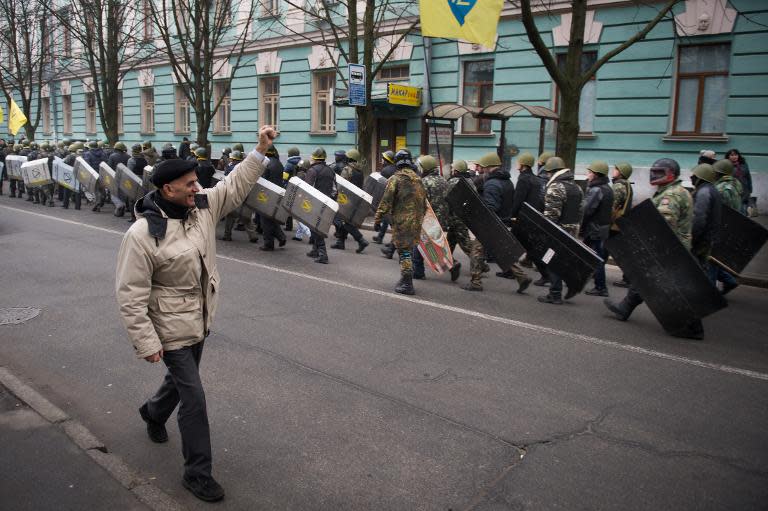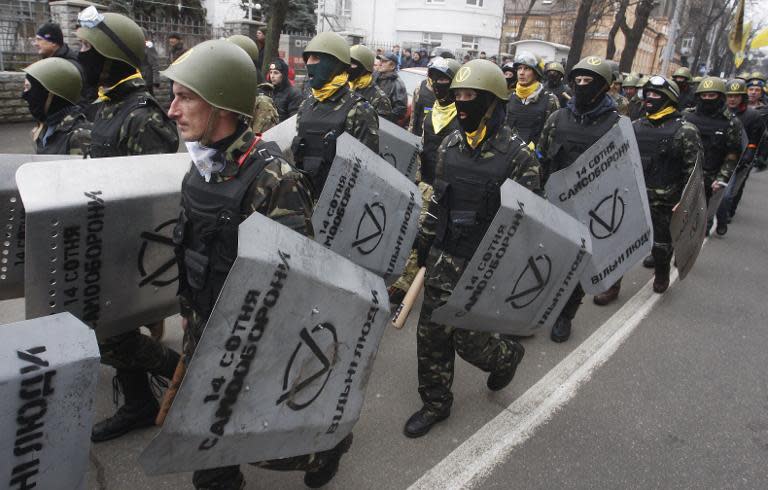Ukraine's autonomous Crimea region leans towards Moscow
In the capital of Ukraine's pro-Russia Crimean region, bus passengers have for days been treated to video footage of violence in Kiev set to a commentary denouncing a "coup d'etat". This autonomous "republic" is traditionally close to Russia, and as demonstrations continue to wrack Kiev and other regions more than two months after anti-government protests erupted, local lawmakers have asked Moscow for protection against what they qualify as "extremists." "The media and pro-Russia structures in Crimea repeat Russian assertions that the protests are a coup attempt," said Andreas Umland, a German political scientist at the Kiev Mohyla Academy. The country's protest movement kicked off in November when President Viktor Yanukovych rejected a key EU trade and political pact in favour of closer ties with Russia, angering pro-EU parts of the population. The domestic movement became a wider, geopolitical tussle between Russia and the West over the future of the ex-Soviet country, and Ukrainians themselves are divided into supporters of each side. In Crimea, those who protest against Yanukovych are labelled "extremists and neo-Nazis" by some politicians and media. The peninsula once belonged to Russia before being attached to Ukraine in 1954 -- all as part of the wider Soviet Union. Ukraine became independent in 1991, but Crimea remains close to its giant neighbour, and the peninsula's port city of Sevastopol continues to host Russia's Black Sea fleet. Early this month, following the violence in Kiev, the parliament of this autonomous region suggested the local constitution be amended to say that Russia is a "guarantor" of Crimea's autonomy from the rest of Ukraine. Central authorities promptly launched a probe on charges of "harming territorial integrity" and the suggestion sparked concern over the possibility of a Georgia-style scenario happening in Ukraine. - A 'Georgian scenario'? - Moscow supports and recognises as independent Abkhazia and South Ossetia, two separatist territories in Georgia where Russia has stationed troops to protect the local population since a brief conflict with Tbilisi in 2008. "The Kremlin seems to be hoping to implement a similar scenario in Ukraine," Umland said, writing in the weekly Dzerkalo Tyzhnia. But Oleksandr Formanchuk, another political scientist, played down the importance of the comments of the local lawmakers, "who do not have enough power to act on what they are demanding." "In the 1990s, when separatist tendencies were very strong in Crimea, a 'Georgian scenario' could have worked," he said. "Today everyone understands that this would trigger an ethnic conflict because the Tatars of Crimea would never accept a Russian protectorate." Tatars, a Turkic ethnic group present in Crimea since the 13th century, suffered hugely at the hands of Stalin, who deported them to Siberia and central Asia where many died of disease or starvation. They came back to the peninsula at the fall of the Soviet Union in 1991, and now represent around 12 percent of Crimea's two million inhabitants. Crimean Tatars actively supported the pro-West Orange Revolution in Ukraine in 2004, and have once again joined the protest movement currently rocking the country. Their leader Refat Chubarov denounced "new separatist tendencies inspired by Russia." "We cannot totally rule out Russian intervention in Crimea today. At an ideological level, we're already there," he told AFP. As a result, opposition activists in the Crimean peninsula have come under pressure. Unidentified opponents recently put up posters in front of the house of Andriy Schekun, an activist from the small town of Bakhchysarai, accusing him of being a "traitor" working for US secret services. Two activists from the party of boxer turned opposition leader Vitali Klitschko recently had their cars set on fire. And ordinary people have also been affected. At the end of January, as protests in Kiev turned deadly, passengers on a train from the western, more pro-West city of Lviv were stopped in Simferopol and had their IDs checked by police who feared the arrival of "fighters".



